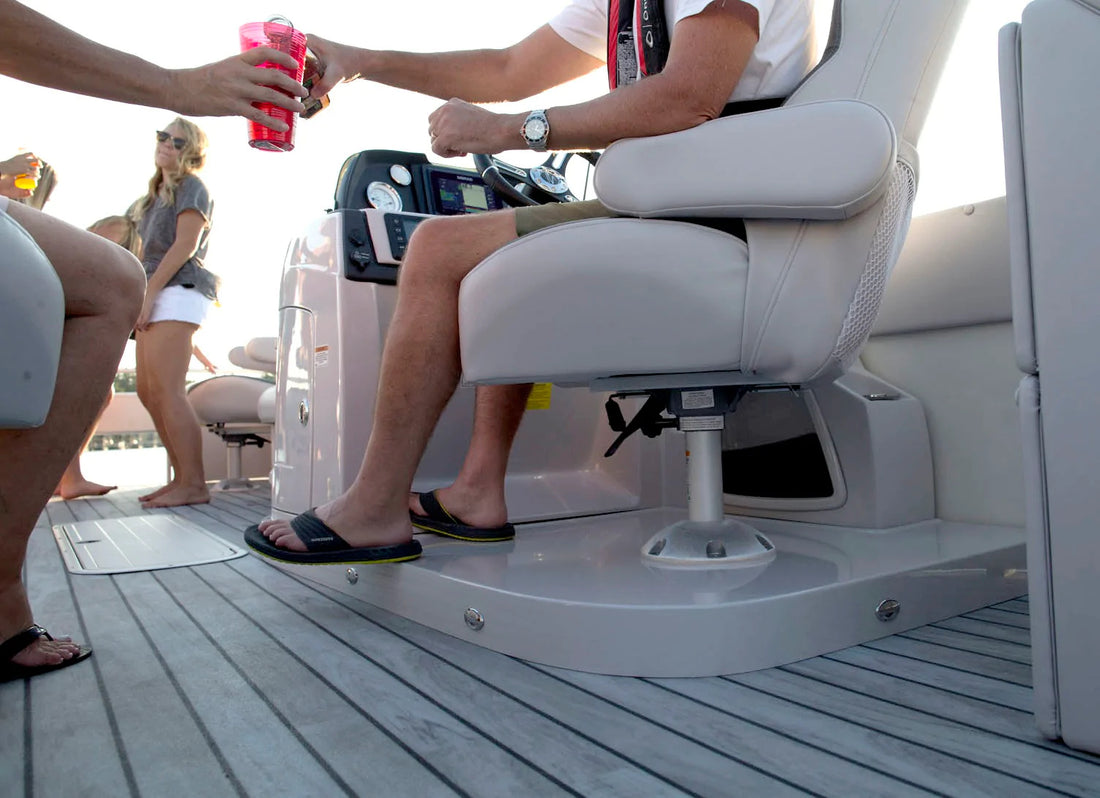
This question continues to spur debate among pontoon owners and boating enthusiasts. When it comes to purchasing a new watercraft or refurbishing pontoons and boats, you’ll want to weigh all your options when it comes to boat floor coverings. Here are the pros and cons of the two top pontoon flooring choices – carpet vs. vinyl flooring for boats.
Boat Carpet
Pros:
Carpet for boats is an affordable, aesthetically-appealing option for those who enjoy simply cruising around the lake without a lot of in and out of the water. Many boaters like the soft feel of carpet underfoot, good traction and the acoustical sound buffering qualities associated with boat carpeting. If you don’t engage in many water sports like water skiing, tubing or fishing, and you want your pontoon flooring to feel like a floating home living room, pontoon carpeting might be right for you. If you decide to go this route, look into marine carpet. Marine carpeting is designed to withstand the elements better, provide greater durability and still won’t break the budget.
Cons:
If a day on the water for you includes swimming, sun bathing, eating, drinking, angling or towing others on the water, you might want to think long and hard about pontoon boat carpet. Think about it this way: Would you want or put carpet in places that usually get wet at home like the bathroom, in the kitchen or in the laundry room?
Carpet’s greatest downfall is that it absorbs everything, including water. It never completely dries and that means mold and mildew start growing underneath. Soon you’ll start hearing your floors creak and feel soft in areas that get wet more often signaling the plywood beneath is rotting. Boat carpeting absorbs spills, sand, pollen, stains and all types of marine smells, especially fish. It’s expensive and hard to clean, and blood and guts, motion sickness spots and colored drink stains never fully come out. Plus, be careful, because fish hooks get imbedded in marine carpeting and that injures bare feet.
With boat carpet, you’ll need to keep your pontoon boat covered when not in use. Can you imagine bird droppings, tree sap or a long list of other outdoor elements that can drop from above and onto your marine carpet? Then think about trying to clean up that mess – nearly impossible and GROSS! Additionally, covered or uncovered, spiders and other bugs build nests and make their homes in soft carpet.
You’ll find you have to replace boat carpet sooner than other pontoon flooring options because it is also not UV-resistant. When sun starts fading it, you will see weak spots that tear more easily. Overall, durability is not boat carpeting’s strong point!
Vinyl Flooring
Cons:
Vinyl is known for retaining heat and it can get hot when exposed to the sun for many hours. This can also cause it to contract and expand if not properly installed. Interestingly, the vinyl marine flooring industry is addressing these problems, and some newer products on the market are cooler to the touch than many other pontoon flooring alternatives and have much fewer issues with contraction and expansion.
Pros:
Vinyl flooring for boats isn’t like your mom’s kitchen linoleum anymore! Vinyl marine flooring comes in a variety of textures, colors and beautiful designs that imitate real teak, hardwoods and weaves without the high maintenance and the exorbitant price tag. (Check out the stunning Solid, Simplicity and Premiere Collections to see what we mean by beautiful!) Vinyl pontoon flooring can actually be quite economical when you consider its longevity and ease of maintenance.
Vinyl flooring, in general, is resistant to many culprits boaters encounter on and around the water on a regular basis, including:
- Moisture, humidity, mold, mildew and rot
- UV-rays
- Stains – fish, harsh chemicals and corrosives, oils, gas, food and drinks
- Marine odors
- Slips and falls
And when it comes time to clean, just take a hose or soap/water and mop to vinyl marine flooring.
Because of its waterproof and UV-resistant qualities, vinyl boat flooring doesn’t crack, peel, flake, puncture or fade, making it the most durable boat flooring available.
Our solid vinyl G‑Floor® Outdoor & Marine vinyl flooring actually comes with a marine-grade top coat that contains an innovative UV- inhibitor for longer color and image retention. The clear, sharp, high-quality images of G‑Floor® Outdoor & Marine are printed underneath the vinyl, not on top or in between as with some vinyl flooring competitors, and is protected by an industry-leading topcoat and wear layer. Because our American-made polyvinyl flooring for boats and pontoons is non-porous and non-woven, it won’t snag from fish hooks or dent from heavy objects like anchors.
Marine vinyl is typically easy to install. For example, G‑Floor® Outdoor & Marinevinyl flooring comes in seamless rolls with Spun bound backing that grabs glue tight for permanent installation. This welded backing also adds cushioning underfoot and helps absorb sound.
Boat manufacturers are seeing the great durability, performance and value of vinyl marine flooring, too. They provide better and longer warranties for vinyl boat flooring because they know it withstands the elements, excessive foot traffic and extensive wear and tear more than other pontoon flooring on the market today.

